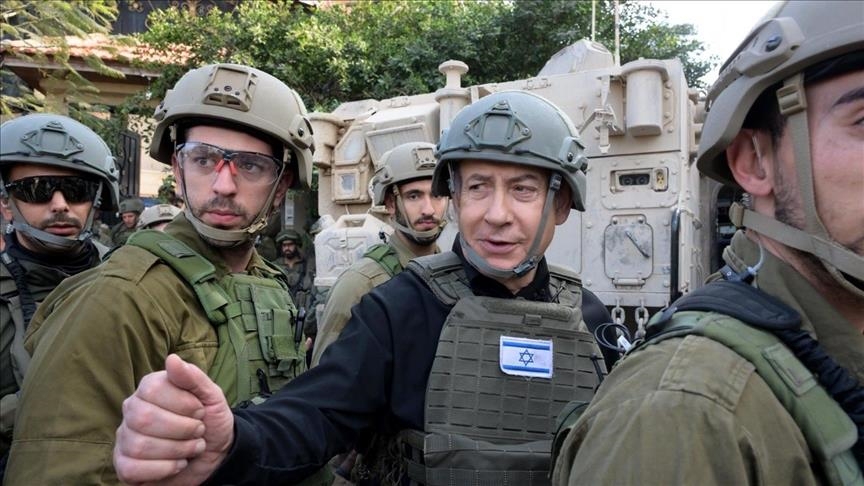UN Voices Concern Over Netanyahu’s Visit to Syria Buffer Zone as Regional Dynamics Shift
International officials call for adherence to longstanding agreements amid heightened activity along the Israeli–Syrian frontier.

ERBIL (Kurdistan24) — The United Nations on Wednesday expressed concern following Israeli Prime Minister Benjamin Netanyahu’s recent field tour of the demilitarized buffer zone in southern Syria — an area that has become increasingly sensitive since major political changes reshaped the Syrian landscape last year. UN spokesperson Stephane Dujarric urged all parties to respect the 1974 Disengagement Agreement, noting that tensions along the frontier remain a matter of international attention.
Speaking to reporters in New York, Dujarric cited Security Council Resolution 2799, passed earlier this year, which reaffirms the need to protect Syria’s sovereignty, unity, and territorial integrity.
He added that the matter was also discussed during Deputy UN Special Envoy for Syria Najat Rochdi’s recent meeting with the Syrian foreign minister.
Rochdi, in a separate written statement, described Netanyahu’s visit as inconsistent with the Security Council’s latest guidance and called for all sides to ensure that established agreements are upheld.
The Syrian Foreign Ministry also criticized the visit, referring to it as a violation of Syrian sovereignty.
A New Strategic Reality in Southern Syria
Israel’s intensified presence in the area follows the collapse of the Bashar al-Assad government in late 2024 — an event that dramatically altered the security dynamics along the Golan frontier.
With power vacuums emerging in areas previously controlled by Damascus, Israeli officials have argued that their increased activity is aimed at safeguarding their border communities from potential instability and preventing armed groups from exploiting the shifting situation.
Israeli decision-makers have long viewed southern Syria as a zone requiring close monitoring due to the presence of Iranian-affiliated militias, weapons transfers, and broader regional rivalries.
Officials in Tel Aviv say the evolving situation requires flexible and active security measures to ensure the safety of civilians living near the Golan Heights.
"Prime Minister Benjamin Netanyahu visited the buffer zone in Syria, with Defense Minister Katz, Foreign Affairs Minister Sa'ar, IDF Chief-of-Staff Lt.-Gen. Zamir, ISA Director Zini, National Security Council Acting Director Reich, Israeli Ambassador to the US Leiter and others," Israel's Defense Forces (IDF) stated on its official X account.
Prime Minister Benjamin Netanyahu visited the buffer zone in Syria, with Defense Minister Katz, Foreign Affairs Minister Sa'ar, IDF Chief-of-Staff Lt.-Gen. Zamir, ISA Director Zini, National Security Council Acting Director Reich, Israeli Ambassador to the US Leiter and others. pic.twitter.com/xRjN23QYCj
— Prime Minister of Israel (@IsraeliPM) November 19, 2025
Heightened Activity and Local Tensions
Local residents and Syrian officials report that Israeli patrols and engineering units have expanded operations in rural areas near the frontier.
According to Syrian government figures, Israel has carried out more than 1,000 airstrikes on targets inside Syria and over 400 cross-border raids since December 2024 — actions Israel often describes as preemptive measures aimed at disrupting hostile military infrastructure.
Syrian authorities say these operations have affected farmland and forested areas and have led to new checkpoints and detentions.
Israel, however, maintains that its actions are primarily focused on countering threats posed by militias and preventing weapons smuggling.
International Diplomacy Under Strain
The UN’s latest call for restraint comes at a time when Syria’s internal situation is deeply unsettled and longstanding regional alignments are being reconfigured.
Diplomats say that with Syria undergoing one of its most uncertain periods in recent years, the Security Council faces increasing pressure to reinforce existing agreements and prevent further escalation along the Israeli–Syrian line of separation.
Israel has repeatedly stressed that it seeks stability along its northern frontier and does not intend to become embroiled in Syria’s internal political shifts.
UN officials, meanwhile, continue to emphasize the need for all actors to adhere to established frameworks — particularly the 1974 Disengagement Agreement — to avoid miscalculations at a moment of heightened regional sensitivity.